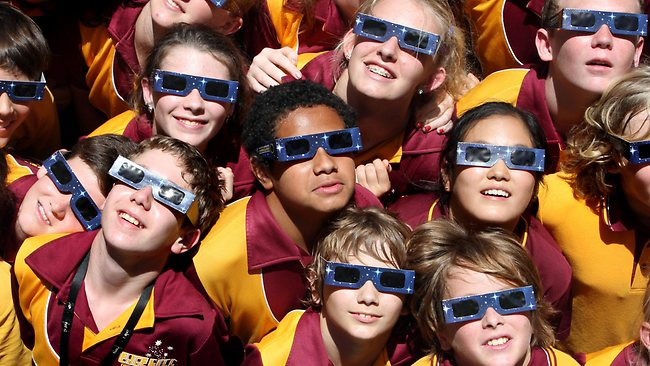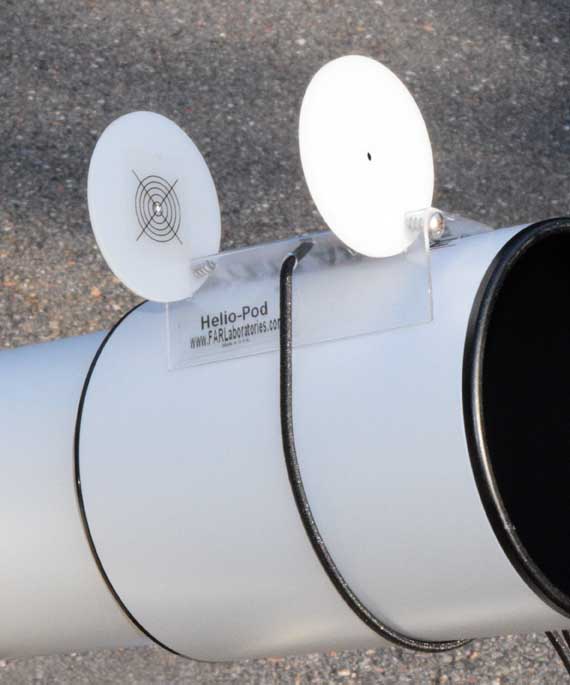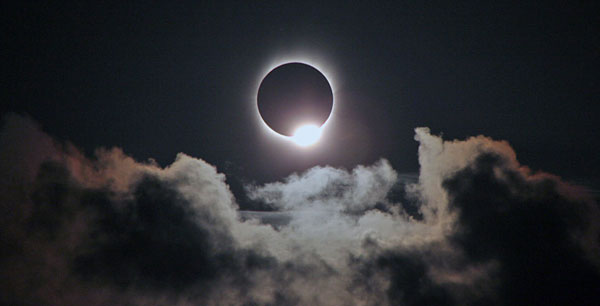Counterfeit eclipse glasses created great confusion in the days prior to the solar eclipse. Luckily few cases of eye damage have been reported.

Mark Margolis / Rainbow Symphony
The great American eclipse has come and gone, leaving people free to exercise another typically American pastime: lawsuits.
Thomas Corey Payne and Kayla Harris, a couple from South Carolina, filed a proposed class action lawsuit against Amazon on August 29th after allegedly suffering from watery eyes, blurry vision, and headaches after using eclipse glasses they bought on Amazon and used to view last month's solar eclipse.
Safe solar viewing should be a relatively simple task. You don’t look directly at the Sun — even at its reflection — unless you have the adequate protective gear. Alternatively, you can look at its projected disk using a pinhole camera or similar device.
For weeks before the eclipse the American Astronomical Society and the three largest professional eye-care groups took great effort to get people to follow one of these methods. They insisted that eclipse glasses and solar viewers should be labeled as ISO certified — with a seal or a reference number — as proof that the product met certain safety and quality requirements.
It appears that most people followed the advice (and common sense), as there were virtually no reports of people suffering from eye damage after looking at the Sun without protection. So far only the suing couple and another person in California have claimed to suffer from blurry vision after using bogus eclipse glasses. (Meanwhile, Brooklyn-based rapper Joey Bada$$ had to cancel three concerts after intentionally staring at the partially eclipsed Sun with unprotected eyes.)
The outcome could have been worse. In the weeks just before the eclipse, it became evident that some counterfeit and non-ISO-certified glasses had entered the market — and Amazon was selling them at a rapid clip.
“We knew this was going on for a while, so we reported it to Amazon and provided them with a list of our approved vendors,” says Jason Lewin, Marketing Director at American Paper Optics, one of the largest manufactures of ISO-certified eclipse glasses in the U.S. Amazon officials were slow to respond, says John Jerit, president of the company, "but once they did we gave them the list of the good guys, so they could get rid of the bad guys.”
Starting on August 10th, Amazon emailed customers who had bought eclipse glasses offering refunds and warning them not to use the product, since there was no way to ensure they were safe.
“Safety makes this a big deal so they blocked all vendors. That caused some confusion and disrupted vendors of legitimate products,” says Lewin.
In a statement sent to Sky & Telescope, an Amazon spokesperson said that the company acted “out of an abundance of caution,” and that all third-party sellers were able to resume sales after providing documentation to verify their products complied with relevant safety standards.
Not being ISO-certified doesn’t automatically make eclipse glasses unsafe. Many glasses spotted in the marketplace and particularly on Amazon came from Chinese companies and lacked ISO certification for minor reasons such as not having the manufacturer's address printed on them.
Still, for many of the Chinese glasses it was almost impossible to know for sure if they were safe to use. “A lot of these companies displayed ISO certificates on their websites, but some were for sunglasses and others had been copied from other companies’ sites,” says Rick Fienberg, who coordinated the AAS's education and safety efforts for the eclipse. “When I contacted a particularly bold offender that was displaying someone else's certificate on its website, that company merely replaced it with a certificate from some other company.”
At that point, telling people to look for the ISO labels printed on their glasses was outdated advice. Instead, Fienberg decided to put the focus on purchasing from reputable manufacturers and vendors and created an extensive list that included all the vendors he could confirm were legit.
In hindsight, the fears of a public health catastrophe did not materialize. “We conclude that the glasses from China were OK," Fienberg says, "or that people got so spooked that they didn’t use them.”
But that doesn't mean that this fake-eclipse-glasses episode had no consequences. Many schools purchased their glasses from vendors not listed by the AAS and could not certify that they were safe. So many administrators opted to keep their students inside during the eclipse or to release them early so it was up to their parents to decide if and how to watch the eclipse.
Collateral Damage
The real victims of the bogus shades were the many reputable vendors that Amazon temporarily or permanently blocked from selling their products. “Amazon doesn’t know the difference between eclipse glasses and solar viewers and telescopes, so they blocked everything with the word 'solar' on it,” says Fienberg. The online giant required vendors to prove their products were ISO certified if they wanted to resume sales. Yet most astronomy and photography filters are specialty products for optical systems, not intended for direct solar viewing by eye and not subject to any standard, leaving some vendors trapped on a loophole.

Sky & Telescope
That's the case of Alan Rifkin, owner of FAR Laboratories, who had his Amazon account blocked while he was on traveling to Casper, Wyoming, to watch the eclipse. He uses the online retailer to sell his Helio-Pod, a simple device similar to a pinhole camera used to find the Sun when operating a telescope.
Rifkin is particularly worried that the letter Amazon sent to his customers — which states the product was not safe and shouldn’t be used — has permanently damaged his company and tarnished his reputation. On top of that, he has to pay for shipping every time people return his product. “The worst part is the lost sales,” Rifkin says. “Sales were going up as the eclipse got closer.”
Amazon refused to comment on any particular case, but its statement mentions, “Sellers that have since provided the appropriate safety documentation will not be responsible for covering the cost of any refunds.”
Major filter manufacturers like American Paper Optics were largely unaffected, though, despite the fact that their glasses were among the counterfeited ones. “If anything, this funneled the demand to good vendors,” says APO's Lewin.
This will also have a cost for Amazon, even if the lawsuits don’t move forward. “We sold 8 to 10 million of our glasses to vendors on Amazon,” says Jerit. “So this is going to be costly for Amazon, but ultimately I think they did the right thing.”
| Donate Your Eclipse Glasses: Astronomers Without Borders wants your no-longer-needed eclipse glasses so they can be donated to schools and other organizations in South America, where total eclipses of the Sun will occur in 2019 and 2020. You can mail yours in or drop it/them off at one of hundreds of donation sites across the United States. Here's more information. |
 0
0









Comments
You must be logged in to post a comment.